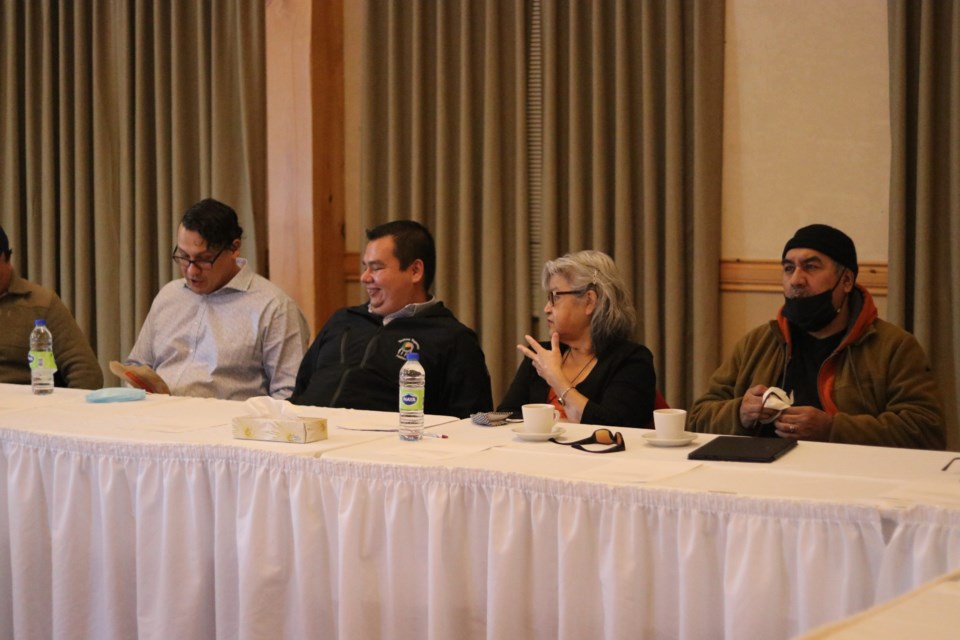Re: Mushkegowuk Going thru the Change
in response to
by
posted on
Dec 05, 2021 10:16AM

NI 43-101 Update (September 2012): 11.1 Mt @ 1.68% Ni, 0.87% Cu, 0.89 gpt Pt and 3.09 gpt Pd and 0.18 gpt Au (Proven & Probable Reserves) / 8.9 Mt @ 1.10% Ni, 1.14% Cu, 1.16 gpt Pt and 3.49 gpt Pd and 0.30 gpt Au (Inferred Resource)

TM from your images it is clear that even Attawaspiskat is sitting down to consult. Chief David Nakogee is sitting on the right side of the picture. Fort Albany and Attawaspiskat were the main supporters of Nesk. This is a huge step forward for progress.

ATTAWAPISKAT, ON, July 30, 2020 /CNW/ - On July 8, 2020, the Ford government in Ontario introduced Bill 197 -- the COVID-19 Economic Recovery Act, 2020, and a mere 13 days later the Bill became law. This omnibus bill amends many statutes, foremost among them the Environmental Assessment Act (EAA). The changes put Ontario's fragile environment, and First Nations who depend on it, at serious risk.
"Ontario pushed these amendments through in a wholly undemocratic way, hiding them in an omnibus bill mispresented by a Covid title, when the EAA changes have nothing to do with getting past the pandemic," says AttFN Chief David Nakogee.
The amendments to the EAA leave a wide range of decision-making to ministerial discretion. Political whims will determine what happens. This creates uncertainty for environmental protection and Indigenous peoples, as little is embedded into the Act that requires the government to impose an environmental assessment in set conditions. Since only those projects that the government lists in regulations, will undergo an EA, and since there are no criteria in the Act for what that list will contain, it is entirely possible that much will escape the EA regime.
"This harkens to the Mike Harris era and the e-coli crisis that revealed that attempts to gut environmental protection regimes ultimately lead to large human cost," says AttFN's lawyer Kate Kempton.
Cloaked in a bill that purports to help the economy recover and respond to COVID-19, the Ontario government was able to quickly push through changes to the EAA. The amendments to the EAA have little to do with responding to the economic impacts of COVID-19; Ford's government had planned changes to the EAA before the pandemic hit. There was little public consultation and no indigenous consultation.
"The pandemic is already having a disproportionate effect on First Nations," says the Chief. "Hundreds of years of colonialism, still being carried on today, have left First Nations largely impoverished, exposed to higher health risks and much lower standards of health care. Our housing is over-crowded. We are at great risk if Covid infiltrates our communities."
"On top of all of this," says Councillor Sylvia Metatawabin, "we are already being told that Crown governments will cut funding to us, to pay for Covid-related measures. We who pay an unfair burden already, will be hardest-hit of all. And now Ontario plans to expose us to more environmental risk. We are the people who live on the land, who are tied to the land. We will pay the price of this folly, if allowed to continue."
Attawapiskat First Nation calls on Ontario to engage in meaningful funded consultations with it (and any other Ontario First Nation who requests this), about the regulations to the Act that will designate projects to which it applies and that set out Part II.4 EA processes. Such consultation must have as its intent to address AttFN's reasonable concerns about the EAA regime. If Ontario fails to do so, it may face legal challenges in the months to come.
SOURCE Attawapiskat First Nation